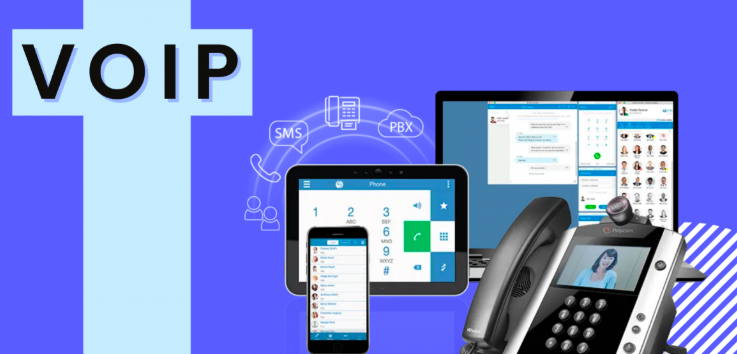
Top 10 Best VoIP Providers & Phone Services Companies
VoIP is revolutionizing business communication, offering significant cost savings and eliminating the need for bulky hardware. Companies are rapidly adopting this technology, with 46% of enterprises already leveraging public cloud workloads. The best cloud-based VoIP systems provide internet calling without on-site equipment, ensuring easy setup, crisp audio, and robust features. However, providers vary widely in pricing, feature sets, and calling areas.
To help you make an informed decision, we’ve conducted an in-depth analysis of the top VoIP services for 2025. Our view focuses on key factors like pricing models, feature sets, scalability, and performance. Read on to discover which VoIP solution best fits your business’s unique communication needs and budget constraints.

Our Top 10 Best VoIP Providers & Phone Services Companies:
Here’s a quick look at our top picks and what they’re best for:
Our Top 10 Best VoIP Providers & Phone Services Companies:
- RingCentral – Best VoIP provider overall
- Vonage – Best for reliability with 99.99% uptime
- Zoom Phone – Best for budget-conscious users
- GoTo Connect – Best for unlimited international calls
- Dialpad – Best for small businesses
- Grasshopper – Best for unlimited number extensions
- Ooma Office – Best for easy setup
- Phone by web.com – Best for low call volumes
- CloudPhone – Best for SMS marketing
- Comcast Business – Best for call s
Our Methodology: How We Reviewed the Best VoIP Providers & Services
We approached this VoIP provider review with a comprehensive methodology, leveraging insights from our product management and customer success team. Our collective SaaS background guided us in developing a user-centric evaluation process. We meticulously assessed how each provider addresses real-world business challenges and enhances customer satisfaction.
We recognize that VoIP needs vary significantly across businesses. Therefore, we’ve highlighted each contender’s distinctive features and practical applications.
Evaluation Criteria:
- Pricing and Free Options: We analyzed cost structures, including paid plans and free versions or trials, to determine overall value.
- User Base: We assessed the size and growth of each provider’s user community.
- Communication Features: We tested the range and effectiveness of available communication tools.
- User Satisfaction: We scrutinized customer feedback from platforms like Trustpilot and BBB, highlighting both positive aspects and areas for improvement.
- Call Quality and Reliability: We tested audio quality and connection stability across various network conditions.
- Scalability: We evaluated how well each service accommodates business growth and increased user numbers.
- Integration Capabilities: We assessed the ability to integrate with other business tools and CRM systems.
Our 10 Best VoIP Companies & Services: An In-Depth Look
1. RingCentral: A Leading Business VoIP Platform
RingCentral’s RingEX cloud communication service is designed for teamwork, combining VoIP calling, SMS messaging, team chat, and video conferencing into one streamlined package. Enhanced with real-time AI and conversation intelligence, this unified communications as a service (UCaaS) platform transforms team collaboration, making every interaction smarter and more efficient.
You can easily set up a custom-built phone system and invite users via email. Features like voicemail transcription, call recording, and adaptive Interactive Voice Response (IVR) menus enhance self-service routing. Beyond core functions, RingEX offers over 300 app integrations, seamlessly fitting into existing communication workflows. Its HD video meetings require no downloads to join and are supported by AI tools like live captioning and in-meeting transcriptions, with smart features to reduce background noise and keep the camera focused on the speaker.
Emma Grotluschen, Senior Manager of Customer Service at Swanson, states that RingEX Contact Center enables their entire team “to improve [their] customer service operation,” highlighting its “reporting capabilities” and “automatic call recording” that tripled call review capacity for supervisors. We chose RingCentral for its customization options, allowing tailored phone settings, custom numbers, business hours, caller IDs, and advanced call routing rules with pre-recorded phone menus to ensure customers connect to the right person. Our experience showed a remarkably smooth setup, easy porting of existing numbers, and quick establishment of new business lines on various devices, with the RingEX app making syncing effortless.
Pros:
- Unlimited domestic calling in the US and Canada
- Ultra plan offers unlimited storage for files and recordings
- Offers whiteboard and annotation video meeting capabilities
Cons:
- Multi-site admin and management features not available on Core plan
- No unlimited international calling options
2. Vonage: Tailor VoIP Solutions to Your Industry’s Unique Demands
Vonage Business stands as a veteran in the UCaaS landscape, delivering a robust mix of VoIP, SMS, live chat, and video functionalities. Its extensive experience translates into smoother operations, offering a reliable and refined communication solution for businesses of all sizes.
The platform boasts 41 built-in features that enhance collaboration, customer engagement, productivity, and employee experience. Agents benefit from tools like Call Announce, which previews caller identity, while managers can access the Busy Lamp Field to see active lines. Kevin Peña, Strategic Partnerships Manager at Headsets.com, praises Vonage Business Communications for enabling seamless login from anywhere, stating, “It’s a simple, user-friendly interface that keeps calls, voicemails, and messages all in one place.” We chose Vonage for its unique industry-specific solutions for healthcare, retail, education, and finance. For instance, in healthcare, it routes patients to the most suitable medical professional and offers HIPAA-compliant virtual visits via VisuWell app integration. Our experience highlighted the fully customizable virtual AI receptionist, which greatly simplified dependable call routing for various scenarios, making customer engagement significantly easier.
Pros:
- Video conference with up to 200 participants
- No user limit on lower-tier plans
- Can flip live calls between devices
Cons:
- Mobile plan lacks single sign-on for in-app authentication
- Local phone number costs an extra $4.99/month
3. Zoom Phone: Reveal Hidden Call Patterns and User Behavior Instantly
Zoom Phone offers a solid VoIP option for budget-conscious small businesses, balancing cost with various features to facilitate team collaboration through messaging, file sharing, and searchable conversations. It integrates well with major third-party apps like Microsoft, Google, and Salesforce, reducing workflow friction and boosting productivity.
For more demanding needs, Zoom Phone provides comprehensive call center capabilities, including unlimited queues, advanced call distribution, voicemail transcription, and intelligent IVR routing. The system allows effortless call switching between devices, ensuring connectivity across platforms. Its Bring Your Own Carrier (BYOC) feature offers flexibility, letting you keep your current PSTN provider while leveraging Zoom’s advanced features, thus maintaining existing contracts and numbers during upgrades. We chose Zoom Phone for its new analytics tools that provide deep insights into call performance and usage patterns, monitoring detailed metrics for call queues, SLAs, volume, wait times, and call outcomes. It also offers Mean Opinion Scores for call quality across sites or networks. Our experience with Zoom Phone’s AI Companion transformed meeting follow-ups, providing concise post-call summaries and voicemail task extraction for organized call-back priorities.
Pros:
- Offers 24/7 phone and chat support
- Features add-ons for unlimited calling in 19 countries
- Switch between any device with multi-device calls
Cons:
- Power Pack analytics are an extra $25 a month
- HD video with noise cancellation limited to Business Plus plan
4. GoTo Connect: Connect Instantly with Anyone on Your Team
GoTo Connect is a unified communications platform for businesses requiring a comprehensive phone system. It offers over 100 features, including unlimited call routing, auto attendants, and an innovative visual dial plan editor that simplifies call management and integrates with other business tools.
You’re not tied to a specific location or device; you can access virtual phone numbers that work in 50+ countries, allowing calls from your computer or mobile. The drag-and-drop interface makes transferring calls or adjusting routing easy. The platform also supports video meetings that sync with your calendar and team chats for quick conversations, allowing file sharing, one-click calls, and emoji expressions. We chose GoTo Connect for its visual dial plan editor, which simplifies call management by allowing easy mapping of call flows, routing to specific departments, and setting up auto attendants with an intuitive drag-and-drop interface. Our experience found the visual tool for complex routing incredibly user-friendly, appreciating seamless integration with Microsoft Teams and existing hardware reuse. The mobile app is a lifesaver for remote work, though we noted a slight delay when catching calls in a ring group.
Pros:
- Unlimited calling area
- Features custom ring orders
- Unrestricted call queues on the Standard plan
Cons:
- Video meetings cap at 250 participants
- Limited monthly SMS credits (80 per seat)
5. Dialpad: Decode Caller Emotions in Real-time with AI-powered Insights
Dialpad is an AI-enhanced UCaaS platform that unifies VoIP, SMS, team chat, and video conferencing into a single, seamless experience. Whether in the office or working remotely, teams can collaborate effortlessly across various devices.
The platform provides unlimited calling within the US and Canada and extends global reach with cloud numbers in 70+ countries. It also offers free unlimited video meetings that participants can join on any device without downloading an app. Its AI-powered seller experience truly elevates the outbound sales dialer, offering live coaching to agents based on sentiment analysis, sharpening their sales skills in real-time for quicker deal closures. We chose Dialpad for its convenience, allowing device switching mid-call and custom routing rules. Its exceptional customer service with responsive support is a major differentiator. Our experience found Dialpad’s AI-powered features and call transcription transformative, with rapid issue resolution and setup assistance from their support team, significantly enhancing workflow through improved desktop app and seamless call management.
Pros:
- 14-day free trial available
- Single sign-on for easy access
- Includes real-time analytics and reporting on all plans
Cons:
- Video meetings capped at 10 participants
- Extra toll-free numbers cost $15/month
6. Grasshopper: Access Live Receptionists Instantly for 24/7 Support
Grasshopper offers a budget-friendly VoIP phone system tailored for small businesses. Starting at just $14, it’s ideal for entrepreneurs seeking to boost communication without breaking the bank. Its website is rich with business advice and tools, reflecting a deep understanding of small business needs.
Despite the low price, the platform provides essential features like business texting, call forwarding, and voicemail transcription to maintain a professional image without significant investment. Customization is where Grasshopper excels, allowing you to create personalized greetings and use custom-hold music. The service runs smoothly across desktop and mobile platforms, ensuring connectivity on the go. We chose Grasshopper for its custom greetings and access to Voice Studio, a service that records your script with a professional voice actor for a nominal fee, ensuring even small businesses project a polished image. Our experience was genuinely impressed with Grasshopper’s live receptionist feature, providing accurate, US-based call answering and inquiry handling 24/7. Despite lacking video meetings or third-party integrations, it’s user-friendly and perfect for small teams.
Pros:
- Seven-day free trial with no credit card required
- Conference call up to 10 people
- Provides unlimited minutes
Cons:
- Lacks video and chat features
- No international phone numbers
7. Ooma Office: Access Your Personal Work Profile from Any Device
Ooma Office is an excellent choice for newcomers to UCaaS platforms. With no contracts and a 30-day money-back guarantee on hardware, businesses can explore advanced communication tools without long-term commitments or financial risk.
The platform provides solutions for virtually any communication need. A standout is the Call Park feature, which allows users to place callers in “parking spots” so anyone can retrieve the call from any device, offering flexibility. The Multi Ring feature ensures you never miss a critical call by ringing multiple devices simultaneously. Ooma’s plug-and-play overhead paging system is remarkably easy to implement for in-house communication—simply connect the adapter, configure it, and broadcast messages. We chose Ooma Office Pro Plus for its Hot Desking feature, allowing employees to turn any phone into their personal extension, ideal for shared workspaces. Staff can access their lines, voicemails, and Caller ID from any device, recognizing significant hardware cost reductions with this adaptable system. Our experience particularly liked the find me/follow me service and seamless mobile app for outbound calls, even keeping an old rotary phone active. Ooma’s Caller Info Match feature was a game-changer, pulling CRM and social media data for personalized client interactions.
Pros:
- Free toll-free number with 500 monthly inbound minutes
- FCC-regulated Enhanced 911 (e911) services
- One-on-one team chat included in all plans
Cons:
- Basic features like text messaging restricted to higher-tier plans
- Concerns about billing practices and difficulty updating payment methods
8. Phone by web.com: Dual VoIP/Cellular Use for Charge-Free Roaming
Phone by Web.com is a budget-friendly VoIP solution for businesses of all sizes. Its basic plan starts at $14.99/month, providing 500 pooled calling minutes and 1,000 pooled texts. Higher-tier “Plus” options at $24.99 offer unlimited calling and texting in the US and Canada. Every user receives a free local number, with premium or customized numbers available for an additional fee.
All plans include enterprise-level features like automated attendants, customizable greetings, and hold music. Account management simplifies setting up over 50 features, including call forwarding, voicemail-to-email, and call screening. Phone by Web.com’s video conferencing tool supports up to 100 participants with screen sharing, recording, and whiteboard capabilities. Advanced scheduling directs calls based on time and day for optimal customer service, and its Call Analytics feature provides detailed call patterns and performance metrics. We chose Phone by Web.com for its AI-Connect feature, which intelligently integrates AI for call routing and appointment scheduling using natural language processing (NLP) to analyze calls and sync with Google/Outlook calendars. Our experience found implementing Phone.com’s Click-to-Call feature user-friendly. While expanding the system had some technical snags that took longer to resolve despite prompt customer support, the service generally proved useful for business calls.
Pros:
- Unlimited video duration
- All plans include a 30-day money-back guarantee and qualify for volume discounts
- All plans are HIPAA-compliant
Cons:
- No team chat feature
- Call analytics only available to pro users
9. CloudPhone: Convert Voice Calls to Text Chats with One Click
Cloudphone.com offers a specialized VoIP phone system that excels in voice and SMS marketing. Upon signup, you receive a toll-free or local number, allowing you to handle business calls on personal devices without compromising private contact info.
The system features automated receptionists for managing incoming calls, text automation for quick responses, and call-to-text technology to seamlessly shift phone conversations to text chats for detailed follow-ups. Cloudphone.com supports team growth with scalable collaboration tools, including call recording for quality assurance/training, call forwarding, and unlimited conference calls. Ring groups ensure multiple phones can answer a single business number so every call is answered. We chose Cloudphone.com for its capability to launch drip campaigns directly to subscribers’ phones, offering marketing potential for sending updates on sales, new products, and other materials to engage audiences. Our experience recently using Cloudphone.com’s SMS keyword feature significantly improved customer inquiry handling with straightforward auto-responses, saving time on routine questions.
Pros:
- All plans include Zapier integration
- Easy-to-manage contact lists
- Offers unlimited calling and messaging to the US and Canada
Cons:
- International calling and messaging is limited to the Small Business plan
- Lower plans don’t have analytics and reporting capabilities
10. Comcast Business: Stay on Top of VIP Clients with Instant Priority Alerts
Comcast Business equips businesses with a comprehensive suite of voice features to boost efficiency and effectiveness. It offers essential functions like Call Forwarding, Extension Dialing, and Call Hold, along with advanced options such as Priority Alert and Selective Call Forwarding.
Comcast Business allows voicemail access by phone and online from anywhere, though initial setup requires an office phone for security. You can change the default voicemail password and create customized greetings. Business Voice and VoiceEdge Select customers can opt to receive voicemail transcripts and files via email with the Readable Voicemail feature. The platform includes tools like Busy Lamp Field (BLF) to see colleagues’ status, enhancing call management and collaboration. Other perks include basic listings in White and Yellow Pages, international calling, and services for fax, alarm, and point-of-sale applications. We chose Comcast Business for its enhanced safety features like Call Trace (tracing last incoming caller for offensive calls) and Caller ID Delivery Blocking (anonymous calling for privacy). Our experience with Comcast Business’s Priority Alert significantly improved team responsiveness to key contacts with special rings for top clients, enhancing customer service without sacrificing overall productivity.
Pros:
- Unlimited nationwide calling across North and parts of South America
- Comprehensive suite of call controls
- Hunt Groups ensure calls are always answered by available team members
Cons:
- No chat, SMS, video, or analytics
- No built-in IVR functionality
How to Compare the Best VoIP Providers & Services
When selecting a VoIP provider, focus on your business’s unique requirements. Consider your budget, team collaboration style, preferred communication channels, call volumes, and primary call destinations.
Next, evaluate features and pricing from potential providers. Key functionalities to consider include call distribution, auto-attendant, caller ID, video conferencing, SMS capabilities, and file sharing options. The chart below offers an overview of essential features and channels across different providers. Use this comparison to identify which service aligns best with your specific business needs.
What Is VoIP?
Voice over Internet Protocol (VoIP) is a modern phone service that transmits your voice as data over the internet rather than through traditional landlines. This technology is particularly versatile because you can use your phone services from any location with an internet connection. These systems are commonly used for:
- Managing incoming and outgoing phone calls in call centers
- Participating in call and video conferencing
- Conducting distance learning sessions
- Providing telehealthcare services
- Keeping in touch with associates, friends, or relatives around the globe
How Do VoIP Services Work?
VoIP technology converts audio from a microphone into data packets and transmits them over the internet to recipients worldwide. When a company subscribes to a VoIP service, its employees use a desktop or browser app connected to the internet. As they speak into the device’s softphone (virtual phone), the app sends audio data to the provider’s servers.
The data then travels through a global network to reach the call recipient. For calls between VoIP numbers, this process occurs entirely over the internet. However, when calling mobile or landline numbers, the VoIP data converts to mobile data (4G or 5G) or a traditional phone signal (PSTN) to complete the connection.
What Is Business VoIP and How Can It Help Your Business?
Business VoIP solutions use the same audio transmission process as regular VoIP but are specifically designed to meet corporate needs. Unlike traditional PBX systems, VoIP offers numerous advantages that can significantly enhance your business operations, including:
- Quick setup
- No hardware maintenance
- Easy scalability
- Diverse communication channels
- Global business presence
- Enhanced internal collaboration
- Improved customer service
- Superior call quality
- Increased agent mobility
- Unified business identity for remote teams

VoIP empowers your team to work more efficiently by integrating AI support and workflow tools into a single application. This versatile platform enables seamless communication with customers across multiple channels, accessible from any device with an internet or cellular connection. By adopting a VoIP system, your business can streamline communications, reduce costs, and improve overall productivity.
How to Choose the Best Business VoIP Services
It’s essential to take your time to compare VoIP providers. Understanding your specific business needs and how each provider’s features align with your company can make a significant difference in pricing and quality.
Here’s how to choose the right VoIP service for your business:
- Consider your company’s needs: Determine your budget, desired features, preferred communication channels, degree of collaboration required by agents, and the geographical areas where you frequently operate.
- Compare collaboration and multichannel features: Look at what communication channels are offered by each provider in our list. Pay attention to their pricing plans, collaboration features of video meetings and team chat, and additional agent-support tools like live call transcription or speech coaching.
- Assess unlimited calling areas: Review your call logs and volume to determine the destinations your agents call most often. If they make frequent international calls, opt for providers with cheap international rates or multi-country unlimited calling areas.
- Determine your desired geographical presence: Consider where your customers are and decide if you want to expand your reach in those areas. Look for a service provider that offers DID virtual numbers in the regions where you want to establish a local presence.
- Compare routing and queueing capabilities: Assess the size of your call center, including the number of agents, supervisors, and departments you have. Determine if you need to route inbound calls to multiple departments like sales. Then, consider routing and queueing features like ring groups, auto attendant menus, skills-based routing, and live queue analytics for supervisors.




